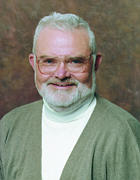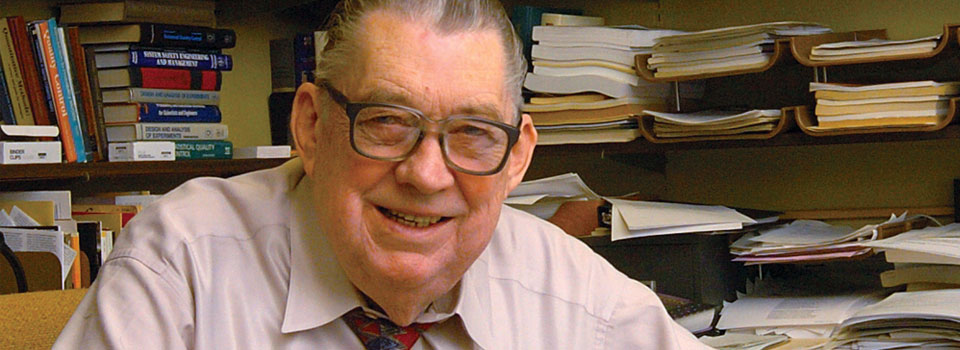Celebrating two legends
Celebrating two legends
| Magazine Section: | Always |
|---|---|
| College or School: | CoE |
| Article Type: | Issue Feature |
| Page CSS: | .sidebar.right {
top: -500px; } .event-intro{display:none;} .sidebar {background-color: #b2b2ff; color:#000;} |
Purdue Engineering has felt a profound loss in the recent deaths of professors James Barany and Robert Squires. Both men accomplished major achievements in their respective fields and will be remembered for their dedication to students’ success.
James Barany
For many, James Barany was synonymous with the School of Industrial Engineering, and he was a fixture in the lives of students and a legend for alumni. Barany died Nov. 8 at St. Elizabeth Central Hospital in Lafayette.
He was an expert in advising thousands of incoming freshmen, undergraduates, and graduate students on every aspect of their education — courses, jobs, internships, coop appointments, majors, and more. Known for an encyclopedic memory of Purdue regulations, people, and precedents, Barany always found a way to solve every tricky academic problem that arose. He also brought this skill to the national level, where he became the top person in the Institute of Industrial Engineers for teaching young faculty mentors the intricacies of advising students.
A native of South Bend, Ind., Barany received his bachelor's degree in mechanical engineering from the University of Notre Dame while working the night shift at the Studebaker Motor Corp. He entered Purdue's industrial engineering graduate program in 1956. Following completion of his master's degree, he was appointed to the faculty as an instructor in 1958 and promoted to assistant professor after completing his Ph.D. in 1961.
As a researcher, Barany gained international recognition for his studies of hemiplegic gait using a force platform of his original design, fabrication, and validation. His rapid promotion to full professor in 1969 was followed by appointment as the associate head of undergraduate programs for the School of Industrial Engineering in 1970, a position he held for many years — even coming back after his first retirement to help out the school.
Up until his death, Barany maintained an active involvement with the IE department and with student organizations on campus. He taught IE 200, Introduction to Industrial Engineering, and was active in class scheduling, the coop program and scholarship selection.
Barany served for 40 years as the faculty advisor for the student chapter of the Institute of Industrial Engineers. He also had served as faculty fellow at Tarkington Hall since 1975.
Barany was both loved and respected by friends, peers and his current and former students. They speak most frequently of his dedication to students and the school, and his great sense of humor.
For example, during the freshman orientation class, Engineering 100, Barany tossed small bags of M&Ms at the students to illustrate that industrial engineers design M (an) an M (achine) systems.
In recognition of his many contributions to the school, an endowment was created in 2010 in his honor. Funds provide support for undergraduate scholarships, graduate fellowships, a named chair for his successor, and a fund that will be used to evolve new programs for internships, advising and course development.
Joseph Mallof (BSIE '72), president and CEO of World Kitchen, LLC, chaired the Barany Endowment Campaign. As a student, Mallof took several honors classes taught by Barany and served as his teaching assistant.
He gave me a lot of responsibility and trusted me, even when I screwed up, Mallof recalls. And he taught me a lot about life beyond academics.
Nathan Uldricks (BSIE '06), a senior consultant at Booz Allen Hamilton who is serving Department of Defense clientele on strategy and operations engagements, also was a teaching assistant to Barany. Some of his favorite memories are the stories Barany told of his time in the Korean War, especially the grudge he still held against Harry Truman for drafting him, Uldricks says. He will be remembered for his humor, dedication to the students and loyalty to Purdue.
Memorial contributions can be made to the Dr. James W. Barany Scholarship Endowment or the IIE Purdue Student Chapter.
Robert Squires

Robert Squires, professor emeritus of chemical engineering, passed away on Nov. 6. He received his BChE degree from Rensselaer Polytechnic Institute in 1957, and MSE, M.S. Math and Ph.D. degrees from the University of Michigan under the direction of well-known catalysis scientist G. Parravano.
Squires joined the School of Chemical Engineering faculty in 1962, and shortly after established an ambitious program in catalysis, working initially with IR spectroscopy and then with other spectroscopic techniques. In the 1970s, along with W.N. Delgass, he established the catalysis research program that is still a major component of the schools research portfolio.
He received the schools Shreve Prize for outstanding undergraduate teaching six times, the colleges Potter Award twice, and the University's highest teaching award in 1981 (then the Amoco Outstanding Teaching Award, now the Murphy Award).
Nationally, Squires received the ASEE Western Electric Award in 1977 and the CMAs Catalyst Award in 1985 for his outstanding teaching.
Squires and his wife, Carol, cared deeply for students and invited them regularly to their home for informal evening conversation and snacks. Many of these visits made a lasting impression.
Bob Davis, general manager of Purdue Enterprise Co. LLC and director of Engineering Entrepreneurship, was a senior ChE student and president of Omega Chi Epsilon when he met Squires. He and members of the chapter were invited to Squires home for a cookout and volleyball game.
“It was pretty rare for students to be invited over to a faculty home,” Davis says. “In fact, it was only the second time it happened for me in my time as an undergraduate.”
Another event was especially memorable. “Professor Squires drove me home from an Omega Chi Epsilon meeting with an invited speaker,” Davis recalls. “This was noteworthy because he drove a vintage Franklin automobile, which I believe required a crank start!”
Emily Liggett (BSChE '77), CEO of Sunnydale, Calif.-based NovaTorque, says her favorite memory of Squires also was being invited to his home. “It was a chance to be back in a home again, and to get to know him, his wife and other students more personally.”
“Regardless of your grade, intellect or work ethic, he invited all students to his home,” Liggett says. “He provided wonderful balance to a somewhat skewed perspective that students can get and a touch of kindness to a required course.”
Squires coordinated the schools co-op program from 1982 until his retirement in December 2004 with emeritus status. At the time Squires held the record — 42 years — for longevity on the faculty.

Comments